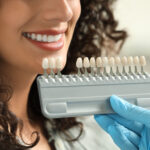Oral thrush is a problem that commonly affects babies, the elderly and people with compromised immune systems. It is not unusual, however, for clients with healthy immune systems to also develop this infection. Accumulation of the fungus Candida albicans on your tongue or the lining of your mouth is both uncomfortable and unattractive, but it is usually easily treated.
Symptoms of Oral Thrush
- White cottage cheese-like patches on the tongue, inside of cheeks, roof of the mouth or even on the tonsils
- Soreness or redness, often painful enough to cause problems swallowing or eating
- Bleeding when the patches are scraped or rubbed
- Feeling of cotton in your mouth
- Loss of taste
- Redness and cracking in the corners of your mouth, especially if you wear dentures.
Oral Thrush During Beast Feeding
A breastfed baby that has trouble feeding and shows signs of white mouth lesions is usually diagnosed with a case of oral thrush.This happens when the fungus is passed from the mother during feeding. If a baby is diagnosed with oral thrush, the mother most also receive treatment to avoid trading the infection back and forth. Painful, itchy, flaky, shiny, red or swollen breasts may indicate an infection or reinfection of the mother.
Curing Oral Thrush
If someone shows any of the signs of the above symptoms, make an appointment to see your doctor or our Placerville dentists. Anti-fungal medication controls the infection. Additional topical anti-fungal cream is prescribed for nursing mothers. Controlling it requires thoroughly cleaning anything that comes in contact with the infected person. This especially includes dentures and mouthguards. Thrush is simply an annoyance for most, but the infection may cause serious complications if it travels beyond the oral cavity and into the esophagus, so treating it promptly and preventing its return is essential.
Preventing Oral Thrush
Good oral hygiene habits are essential to keep your mouth fungus free. Wash your hands often and before you brush and floss daily. Change your toothbrush every three months or as soon as it shows signs of wear. Protect your baby’s oral health by using a clean soft cloth to wipe their mouth and gums on a daily basis. Our Placerville dentists can answer your questions about oral thrush, and help keep your mouth healthy. Contact us today for an appointment with our local Placerville dental professionals.



0 Comments